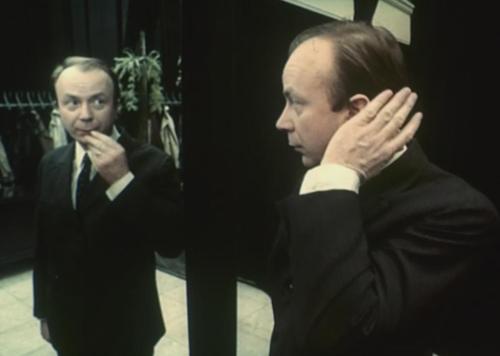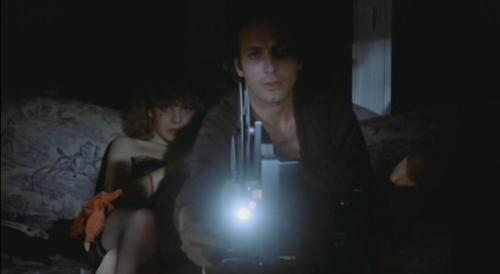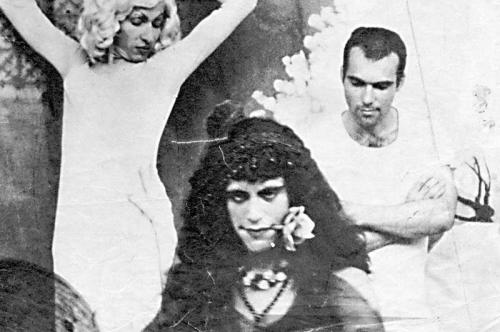The Dancing Hawk (Grzegorz Królikiewicz, 1977, Poland)- 3.5/5
Pure madness, this is. I was left completely disoriented and muddled by the end of the film. You can tell that the filmmaker doesn’t give a fuck for continuity, coherence, consistency in style, and order. Neither is he interested in whether the viewers of his film even understand his film at all. He’s more interested in experimenting with the camera, using unconventional practices, and testing his cinematic theories. He completely does away with the conventional 180 degree rule for conversational scenes and filming from just one perspective.
Bontoc Eulogy (Marlon Fuentes & Bridget Yearian, 1995, Philippines)- 2.5/5
Maybe, I am getting so worked up on how the filmmaker is dishonest about the identity of the grandfather Markod, who happens to be just fictional, and this seemingly true search for the grandfather’s remnants. But it does truthfully portray one of the historical abominations the Americans have done once again to other minorities, specifically the Filipinos in this film. The film may not be that highly effective, especially in its use of old footage and newly enacted scenes, but it really got me into deep thinking, and even a heated argument, about the contradiction of being proud of your own native roots and yet having left it all behind for prosperity and wealth in another country, the free-floating identity of immigrants like me, and the portrayal of truth in films.
The Mirror (Jafar Panahi, 1997, Iran)- 3/5
Whether the second half of the film was staged and scripted or it was not planned at all and Panahi just went along with it, there is no question or doubt that cinema is a mirror, reflecting and representing reality in one way or another. Even the most absurd and unrealistic films refer to real-life objects and events, or at least some resemblances of them. The point of the film couldn’t have been even more obvious. But it’s just that, in terms of showing the almost indistinguishable distinction of and the harmony between reality and cinema, Kiarostami’s Close-up and Makhmalbaf’s A Moment of Innocence work way better.
The Dupes (Tewfik Saleh, 1973, Syrian Arab Republic)- 4/5
The film shows the flashbacks of each primary character from this almost accurate take on human memory. Memory is loosely connected based on vague associations between similar actions, sensations, events, etc. It also plays with the fact that we always recall and keep coming back to scenes and moments we’ve already remembered before. Certain moments in the past of each character are repeated, brought up from time and time again; it’s a wonder why repetition in flashbacks is still never a common method in films, considering how we, as humans, respond greatly to repetition. And I adore the close-up shots of the olive trees among the many brilliant visual moments in the film.
Butterflies Have No Memories (Lav Diaz, 2009, Philippines)- 3.5/5
Not as ambitious and contemplative as the other Lav Diaz films I’ve seen, but there’s just only too much material one can fit in a film that is part of an anthology. I don’t think anyone can really empathize with Mang Pedring’s predicament that, once he finally decides to act, his course of action just seems pretty pathetic and cowardly. Even with Diaz’s Marxist leanings and great affinity with the working class, there is the suggestion in the film that, maybe, some of the working-class people also have themselves to blame for their poor living conditions when they sometimes just rely on others, on false security, and on work that may be seemingly good in the long-run. At first, the ending seems anti-climactic but there must have been really deep realizations, thoughts of serenity and beauty, and feelings of guilt brewing inside of them in the final scene.
Arrebato (Ivan Zulueta, 1980, Spain)- 5/5
Even with the presence of the camera as a seemingly antagonistic, anthropomorphic character, I don’t think the film claims to have a grand statement about cinema in general. It seems to be more interested in these two strong personalities, their fascination and enthrallment with each other, and how they only take pleasure in states of trance, unconsciousness, lucidity, and ecstasy, basically in what film, not unlike drugs, can easily offer. So, how befitting the ending is for the fate of our two protagonists, even though the thought of it happening in reality may be completely horrifying.
Flaming Creatures (Jack Smith, 1963, USA)- 4/5
I had muddled feelings of joy, distress, annoyance and pleasure while watching this film again. It literally is an orgiastic film full of both displeasing images of an agitated rape and sensuous images of fluid sexuality and men and women dancing and just plainly having fun. When I first watched this years ago, I was probably irritated by the seeming pointlessness of the film and the jiggling breasts and genitalia. But I have recently come to the realization that, although films always have a function or content in one way or another, there doesn’t always have to be the need to have a social, moral or political content in a film.
Pure madness, this is. I was left completely disoriented and muddled by the end of the film. You can tell that the filmmaker doesn’t give a fuck for continuity, coherence, consistency in style, and order. Neither is he interested in whether the viewers of his film even understand his film at all. He’s more interested in experimenting with the camera, using unconventional practices, and testing his cinematic theories. He completely does away with the conventional 180 degree rule for conversational scenes and filming from just one perspective.
Bontoc Eulogy (Marlon Fuentes & Bridget Yearian, 1995, Philippines)- 2.5/5
Maybe, I am getting so worked up on how the filmmaker is dishonest about the identity of the grandfather Markod, who happens to be just fictional, and this seemingly true search for the grandfather’s remnants. But it does truthfully portray one of the historical abominations the Americans have done once again to other minorities, specifically the Filipinos in this film. The film may not be that highly effective, especially in its use of old footage and newly enacted scenes, but it really got me into deep thinking, and even a heated argument, about the contradiction of being proud of your own native roots and yet having left it all behind for prosperity and wealth in another country, the free-floating identity of immigrants like me, and the portrayal of truth in films.
The Mirror (Jafar Panahi, 1997, Iran)- 3/5
Whether the second half of the film was staged and scripted or it was not planned at all and Panahi just went along with it, there is no question or doubt that cinema is a mirror, reflecting and representing reality in one way or another. Even the most absurd and unrealistic films refer to real-life objects and events, or at least some resemblances of them. The point of the film couldn’t have been even more obvious. But it’s just that, in terms of showing the almost indistinguishable distinction of and the harmony between reality and cinema, Kiarostami’s Close-up and Makhmalbaf’s A Moment of Innocence work way better.
The Dupes (Tewfik Saleh, 1973, Syrian Arab Republic)- 4/5
The film shows the flashbacks of each primary character from this almost accurate take on human memory. Memory is loosely connected based on vague associations between similar actions, sensations, events, etc. It also plays with the fact that we always recall and keep coming back to scenes and moments we’ve already remembered before. Certain moments in the past of each character are repeated, brought up from time and time again; it’s a wonder why repetition in flashbacks is still never a common method in films, considering how we, as humans, respond greatly to repetition. And I adore the close-up shots of the olive trees among the many brilliant visual moments in the film.
Butterflies Have No Memories (Lav Diaz, 2009, Philippines)- 3.5/5
Not as ambitious and contemplative as the other Lav Diaz films I’ve seen, but there’s just only too much material one can fit in a film that is part of an anthology. I don’t think anyone can really empathize with Mang Pedring’s predicament that, once he finally decides to act, his course of action just seems pretty pathetic and cowardly. Even with Diaz’s Marxist leanings and great affinity with the working class, there is the suggestion in the film that, maybe, some of the working-class people also have themselves to blame for their poor living conditions when they sometimes just rely on others, on false security, and on work that may be seemingly good in the long-run. At first, the ending seems anti-climactic but there must have been really deep realizations, thoughts of serenity and beauty, and feelings of guilt brewing inside of them in the final scene.
Arrebato (Ivan Zulueta, 1980, Spain)- 5/5
Even with the presence of the camera as a seemingly antagonistic, anthropomorphic character, I don’t think the film claims to have a grand statement about cinema in general. It seems to be more interested in these two strong personalities, their fascination and enthrallment with each other, and how they only take pleasure in states of trance, unconsciousness, lucidity, and ecstasy, basically in what film, not unlike drugs, can easily offer. So, how befitting the ending is for the fate of our two protagonists, even though the thought of it happening in reality may be completely horrifying.
Flaming Creatures (Jack Smith, 1963, USA)- 4/5
I had muddled feelings of joy, distress, annoyance and pleasure while watching this film again. It literally is an orgiastic film full of both displeasing images of an agitated rape and sensuous images of fluid sexuality and men and women dancing and just plainly having fun. When I first watched this years ago, I was probably irritated by the seeming pointlessness of the film and the jiggling breasts and genitalia. But I have recently come to the realization that, although films always have a function or content in one way or another, there doesn’t always have to be the need to have a social, moral or political content in a film.




